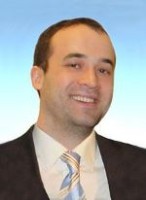Trustees and Managers

Denis Masgutov
Founder
 View Bio
View BioThe co-Founder and Director of the International Dr. Svetlana Masgutova I nstitute of Poland and also served as an International Specialist of the Masgutova Method ® . He graduated in Special Education and Psychology in Russia, received his Post-Graduate degree in Psychology at the Moscow State Sholokhov University. He also studied at Psychology Faculty at the University of Warsaw in
Poland (completed 5 years). In addition, he accomplished the Post-Graduate Polish language studies at Krakow University (Poland), and was certified in Massage Therapy (Russia). He knew 5 languages.
Denis Masgutov had substantial experience in working with adults and children with neurodevelopmental challenges and learning difficulties such as: cerebral palsy, motor development deficits, ADHD, ADD, autism and Asperger's syndrome, FAS, intellectual delay, aggressive behavior, dyslexia, and PTSD.
Since 2009, Denis Masgutov had been organizing the International Camps for children and adults with neurodeficits and learning difficulties and led the continuing education program for PT, SP, OT, and other specialists in MNRI® programs through lectures, workshops, camps, conferences, and clinics in Poland.
He taught MNRI® programs including Dynamic and Postural Reflex Pattern Integration, Lifelong Reflex Integration, Neuro-Tactile Integration, Oral-Facial Reflex Integration, Neuro-Structural Reflex Integration, and Dysfunctional and Pathological Reflex Repatterning. He was also a co-researcher at conferences and workshops in Poland using modern technologies/equipment (REMG, BTS).
Denis is the co-author of over 30 articles and manuals. Just prior to his death, he
created an incredible series of workshop videos on new MNRI techniques (March-June 2016) focusing his primary interest on reflex pattern correction and integration for support of sensory-motor developmental milestones. His interpretation of the psychological and neurodevelopmental aspects of reflex integration was oriented toward support of sensory-motor, emotional, behavioral, and cognitive functions. He supported his concepts using EMG/BTS technologies to obtain objective data on the correlation of reflex integration (ATNR, Crawling, Leg Cross Flexion-Extension, Automatic Gait) with neurostructural and milestone changes (sitting, standing, walking, and etc.) in over 300 children with CP and
autism. Through this research he developed both a deeper understanding of and developed many new practical techniques for working with sensory, motor deficits and stress, the withdrawal response, and the blocking of breathing reflex patterns.
For more details visit Full Bio
6718 Lake Nona Blvd., Suite 180
Orlando, FL 32827
800-643-7307
contact_mgs@mgsns.org

